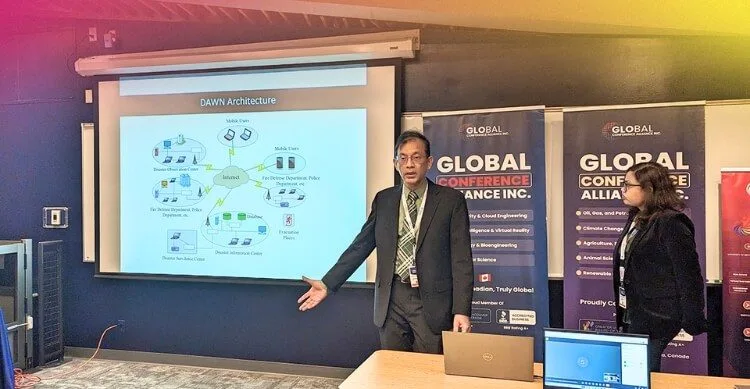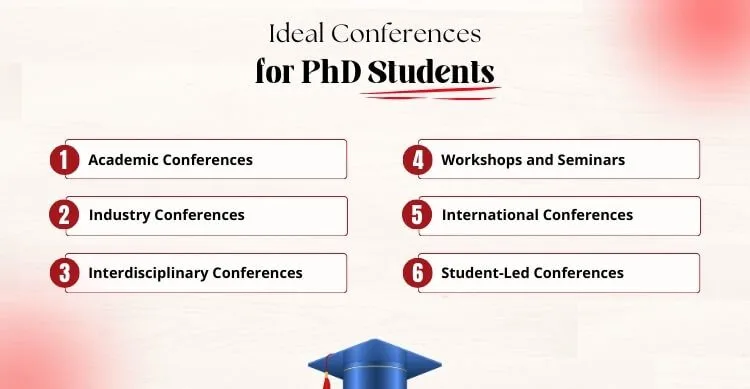Getting a PhD involves more than just research and writing; it also involves academic networking. Attending conferences plays a crucial role in this journey, offering a platform to present your work and connect with other scholars. But how many conferences should you attend during your PhD?
You should attend at least 2-3 conferences per year during your PhD to effectively network, showcase your research, and receive valuable feedback. The optimal number varies depending on your specific research field, career goals, and the opportunities that arise.
Don’t worry about the quantity, focus on the quality of the conferences you choose. By carefully selecting the most relevant events, you can make the most of your academic journey. Follow the rest of the article to explore how to make informed decisions about conference participation during your PhD.
What Happens in A Conference?
Conferences provide a venue for professionals to exchange knowledge and showcase their innovations.It encourages networking across different fields, promoting teamwork. They also offer a space for participants to expand both their academic and professional horizons.

During these events, experts lead workshops and present inspirational keynotes. This increases participants’ understanding of new trends and methodologies. Besides that, the importance of student engagement in conferences shines here, as they bring unique ideas and energy.
There are other networking opportunities besides structured sessions, such as social events and coffee breaks. These interactions often lead to future collaborations and mentorships. Overall, conferences are about learning, growing, and building lasting connections.
Is Conference Mandatory for PhD Students?
No, attending conferences during a PhD isn’t mandated by all academic programs universally. However, many scholars and advisors highly recommend participation in these events. They view it as essential to professional development and networking in the field.
Each academic institution or department might have its unique set of expectations. These factors can influence the decision of a student whether or not to attend a conference. PhD candidates’ choices are usually determined by their specific goals and resources.
The individual, along with their advisory committee, decides whether or not to attend conferences. It isn’t a universal requirement, but it is considered beneficial. Guidance from mentors can help determine the best approach for each student.
How Many Conferences Should You Attend During Your PhD?
Choosing how many conferences to attend during your PhD can have a significant impact on your academic career. Typically, attending 2-3 conferences per year is beneficial for networking, showcasing your research, and gathering feedback. The ideal frequency varies based on several factors specific to each student’s situation. Below are detailed explanations of factors that influence PhD student conference attendance:
Research Field Specificity
The frequency and global spread of conferences may differ among fields. Depending on your area of study, the number of relevant opportunities can vary. Students should prioritize conferences that align closely with their research topics. This ensures maximum benefit and relevance from each event attended.
Career Goals
Your career objectives play a crucial role in choosing which conferences to attend. If you aim for academia, presenting at academic conferences is beneficial. For industry-focused goals, look for events with strong industry participation. This aligns your conference attendance with your future career path.
Geographical Location
Consider the location of the conference relative to your current place of study. Local conferences reduce travel costs and time. However, international conferences can offer broader networking opportunities. But it is worthwhile to balance potential benefits against potential costs.
Funding Availability
Conference attendance often depends on funding availability. Find out if your university offers any funding opportunities or if the conference itself offers funding opportunities. It can determine which conferences you can attend and how many you can attend.
Research Progress
The research stage can influence conference participation. Early in your PhD, attending fewer conferences may be sufficient. As your research develops, presenting more frequently becomes valuable. Regular attendance can track your progress and refine your work.
Networking Potential
Networking plays a crucial role when attending conferences as a PhD student. Engaging with peers and experts helps strengthen your academic profile while opening doors to new opportunities. For a broader perspective, many students consider attending global events like conferences in Canada, where they can exchange ideas and build connections that may lead to future collaborations. The more events you participate in, the stronger your professional relationships become.
Types of Conferences Ideal for PhD Students
PhD students often find conferences valuable for their professional development. Gatherings like this are great places to share research, get feedback, and network. Maximizing these benefits requires choosing the right type of conference.
Below are some conference types PhD students might find useful:
Academic Conferences
Academic conferences provide PhD students with opportunities to present scholarly research. These events typically feature presentations on new research findings. Attendees can engage with leading experts and receive direct feedback on their work. Such conferences are invaluable for staying updated on your field’s latest developments.
Industry Conferences
This type of conference is ideal for students aiming for a career in industry. They highlight the latest industry trends and technologies. Networking with professionals can lead to internships or job opportunities. Industry conferences often bridge the gap between academic research and practical applications.
International Conferences
Attending international conferences expands your perspective and professional network beyond local boundaries. These events gather diverse professionals from various countries, offering a broader scope of knowledge. They also add value to your CV, showcasing your ability to engage with a global community. Language and cultural exchange add significant value too.
Interdisciplinary Conferences
These conferences bring together experts from multiple disciplines. They are perfect for PhD students whose research connects with various fields. Interdisciplinary events encourage innovative thinking and solutions that come from cross-disciplinary collaboration. Such interactions can open up new research avenues and methodologies.
Student Conferences
Student conferences are designed to be supportive and welcoming for students. These events provide a relaxed setting where students can practice and improve their presentation skills. They help students gain confidence before attending bigger academic conferences. Often, student conferences also offer mentorship and personalized feedback, making them a great place for academic growth.
Virtual Conferences
Virtual conferences are becoming more common and are particularly accessible to students. They eliminate travel costs and allow participation from anywhere in the world. These platforms often offer recordings, enabling attendees to revisit sessions at their convenience.
Is it Worthwhile for PhD Students to Attend Conferences?
As a PhD student, attending conferences can be an important part of your academic journey, offering numerous benefits. During these gatherings, you have the opportunity to share research, network, and learn from your peers and leaders.
Here are some reasons why attending is worth your time and effort:
- Networking Opportunities: Conferences connect you with other researchers and professionals in your field. These connections can lead to future collaborations and job opportunities.
- Feedback on Your Research: Presenting your work allows you to receive constructive feedback from experts. This can refine your research direction and improve your work.
- Latest Industry Insights: You gain access to the latest research and developments before they’re published. Staying ahead of trends can significantly benefit your studies.
- Professional Development: Participating in conferences helps develop essential skills like public speaking and academic writing. These skills are invaluable for your future career.
- Publication Opportunities: Many conferences offer opportunities to publish your research in respected journals or conference proceedings. This enhances your academic profile and CV.
- Inspiration and Motivation: Hearing about the work of others can inspire new ideas and approaches in your research. It’s also a great morale booster.
By taking advantage of these opportunities, you can be on your way to a successful and fulfilling academic career.
Frequently Asked Questions About How Many Conferences Should You Attend During Your PhD?
Here are some of the FAQs and their relevant answers for a clear concept of how many conferences should you attend during your PhD:
Is There a Minimum Number of Conferences I Should Attend During My PhD?
While there’s no strict minimum, aiming to attend at least one or two conferences annually can be beneficial for networking and presenting your research.
How Do I Choose Which Conferences to Attend?
Select conferences that align with your research interests, offer networking opportunities with experts in your field and fit within your time and budget constraints.
Can Attending Too Many Conferences Be Detrimental?
Yes, overcommitting to conferences can detract from valuable research time. It’s important to balance conference participation with your research and academic responsibilities.
Should I Prioritize International Conferences Over Local Ones?
International conferences can offer broader networking opportunities and exposure to global research trends, but local conferences are also valuable for building closer community ties and are often more affordable.
How Important Is Presenting at Conferences During My PhD?
Presenting is highly valuable as it provides critical feedback on your research, enhances your CV, and improves your public speaking and presentation skills. Aim to present at least once during your PhD program.
Conclusion
As we wrap up, it’s clear that attending conferences during your PhD is more than just an academic formality. It’s a platform for personal and professional growth, offering unparalleled opportunities to network and present your research.
It’s important to understand that choosing how many conferences should you attend during your PhD is a matter of aligning opportunities with your particular path. The right conferences can dramatically shape your academic path, offering insights and connections that are invaluable.
The experiences gained from these academic gatherings are invaluable. Besides enriching your PhD experience, they prepare you for success after graduation. By selecting conferences that are relevant to your research interests and professional objectives, you can make each conference count.







